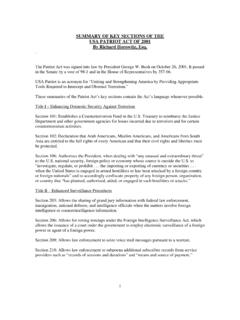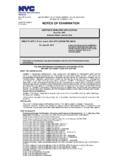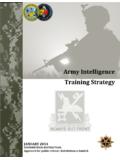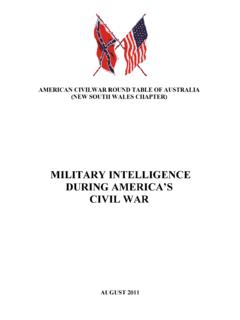Transcription of A Framework for Understanding Intelligence - rhesq
1 " " RICHARD HOROWITZ A Framework for Understanding Intelligence Not surprisingly, many argue that Intelligence is an integral element of decisionrnaking, Yet, an equally convincing case can be made that not only does Intelligence only rarely assure success on the battlefield and in policy decisionmaking, but it can very well be of no use whatsoever, even counterproductive, The discrepancy between these two positions will be explored while formulating a Framework for Understanding Intelligence , ENLIGHTENED SOVEREIGNS The basic importance of Intelligence can be found in Biblical times. The Prophet Ezekiel recounts that: .. if when the watchman sees a sword come upon the land he blasts the hom and warns the people.
2 Then whoever hears the sound of the hom and takes no warning, if the sword comes and takes him away, his blood shall be upon his own head .. but if the watchman sees the sword, and does not blast the hom and the people are not warned, if the sword comes, and takes any person .. 1 Richard Horowitz, a licensed private investigator and security consultant based in New York, served in the Israel Defense Forces with the rank of captain. He earned an MA in international relations from New York University, held a Mortimer Zuckerman Fellowship from Columbia University, and is studying law at the Benjamin N. Cardozo School of Law. He is a member of the American Society for Industrial Security and In telnet, an international investigators' association.
3 389 390 RICHARD HOROWITZ God holds the watchman responsible in the second case. Medieval Jewish Biblical commentators explain the watchman's subsequent guilt in the fact that the people "have appointed him and trusted him."2 The ancient Chinese military authority Sun Tzu gave Intelligence prominence in The Art of War. Never using the word Intelligence per se, Sun Tzu opens his chapter thirteen with "Estimates," and closes with" Employment of Secret Agents." Sun Tzu begins "Estimates" as follows: "War is a matter of vital importance to the state; the province of life or death .. , therefore, appraise it in terms of the five fundamental factors .."3 These five factors are moral influence, weather, terrain, command, and doctrine.
4 In "Employment of Secret Agents," Sun Tzu argues that: "What is called 'foreknowledge' cannot be elicited from spirits, nor from gods, nor by analogy with past events, nor from calculations. It must be obtained from men who know the enemy situation."4 He thereupon analyzes five categories of spies, thus emphasizing the importance of the information these men can provide. * While Sun Tzu does not relate his analysis of secret agents with the importance of "foreknowledge" regarding his five factors, clearly information about terrain, and the enemy's moral influence, command, and doctrine can be acquired through the use of spies. Hence, an Understanding of Sun Tzu's writings will lead to the conclusion that good Intelligence is essential.
5 Sun Tzu himself ends The Art afWar by saying: And therefore only the enlightened sovereign and the worthy general who are able to use the most intelligent people as agents are certain to achieve great things. Secret operations are essential in war; upon them the army relies to make its every move. 5 A contrary approach is espoused by an equally authoritative source. According to David Kahn, "Carl von Clausewitz disdained Intelligence ,"6 citing the following selection from On War to support his claim: "Many Intelligence reports in war are contradictory; even more are false, and most are uncertain .. In short, most Intelligence is false."7 While acknowledging that Clausewitz does not dismiss the importance of good information, Kahn presents a well-developed analysis of On War, showing that Clausewitz believed several significant factors -chance, imponderables, limitations of observation and of analysis, and preconceptions -preclude the efficacy of good Indeed, Kahn points out that of the battles covered in Edward S.
6 Creasy's Fifteen Decisive *The five categories of agents are: (1) natives -the enemy's citizens; (2) inside agents -officials of the enemy; (3) double agents -enemy spies; (4) expendable agents -your own spies given fabricated information in the hope that they will be captured and confess; (5) living agents -those who return with information. INTERNATIONAL JOURNAL OF A Framework FOR Understanding Intelligence 391 Battles o/the World: From Marathon to Waterloo, only in the battle of Metaurus, a Roman victory over the Carthaginians, did victory depend on Kahn does indicate however, that the introduction of aerial photography, codebreaking, and satellite reconnaissance, for example, makes Intelligence quite different than that of Clausewitz's day.
7 Quoting several prominent modern military authorities, Kahn asserts that modern day Intelligence is indeed a much needed capability. Nevertheless, he notes that Clausewitz's five factors limiting the usefulness of Intelligence are the same ones that cause modern day Intelligence failures. 10 Clausewitz's negative perception of Intelligence , however, does not contradict the usefulness and successes of modern day Intelligence capabilities. Clausewitz understood the need for information. Sun Tzu portrayed the notion of "foreknowledge" in a more encouraging and functional light, but Clausewitz would agree that if accurate Intelligence could be acquired, it would surely be important.
8 Those drawbacks of Intelligence that Clausewitz viewed as characteristic do point to an inherent problem in the nature of trying to comprehend an opponent and foretell his actions. The two main elements of Intelligence , acquiring and Understanding information, are replete with systemic and intrinsic difficulties. Nations invest a great deal in the discipline of keeping secrets, and information can easily be misunderstood. Improvements in collection and analysis techniques do not ensure a better overall Intelligence capability. The gap between the need to know and the problematics in knowing is significant; despite much research and reorganization of Intelligence organizations, bridging the gap may prove to be an impossibility.
9 The difficulty is inherent, and is found in interpersonal relationships as well as in international; it can well be argued that as long as misunderstandings continue between individuals, Understanding and tranquillity will not characterize international behavior.. Intelligence is an important aspect of international politics; countries that feel they have a better Understanding of their neighbors, a potential partner in conflict, or an enemy, may very well feel more assured of their own security. Good Intelligence could provide a warning of the other's intentions, permit a surprise to be foiled, and avoid a conflict, or conversely, to develop one earlier, for example, in the form of a pre-emptive strike.
10 DEFINING THE TERRITORY The field of Intelligence can be clearly outlined. The " Intelligence process" was depicted in a very concise manner twenty years ago by a Senate committee formed to study United States Intelligence . After presenting the major Intelligence AND COUNTERINTELLIGENCE VOLUME 8, NUMBER 4 392 RICHARD HOROWITZ organizations that comprise the Intelligence community, the Church Committee Report outlined the process as follows: Those who use Intelligence , the 'consumers,' indicate the kind of information needed. These needs are translated into concrete 'requirements' by senior Intelligence managers. The requirements are used to allocate resources to 'collectors' and serve to guide their efforts.







